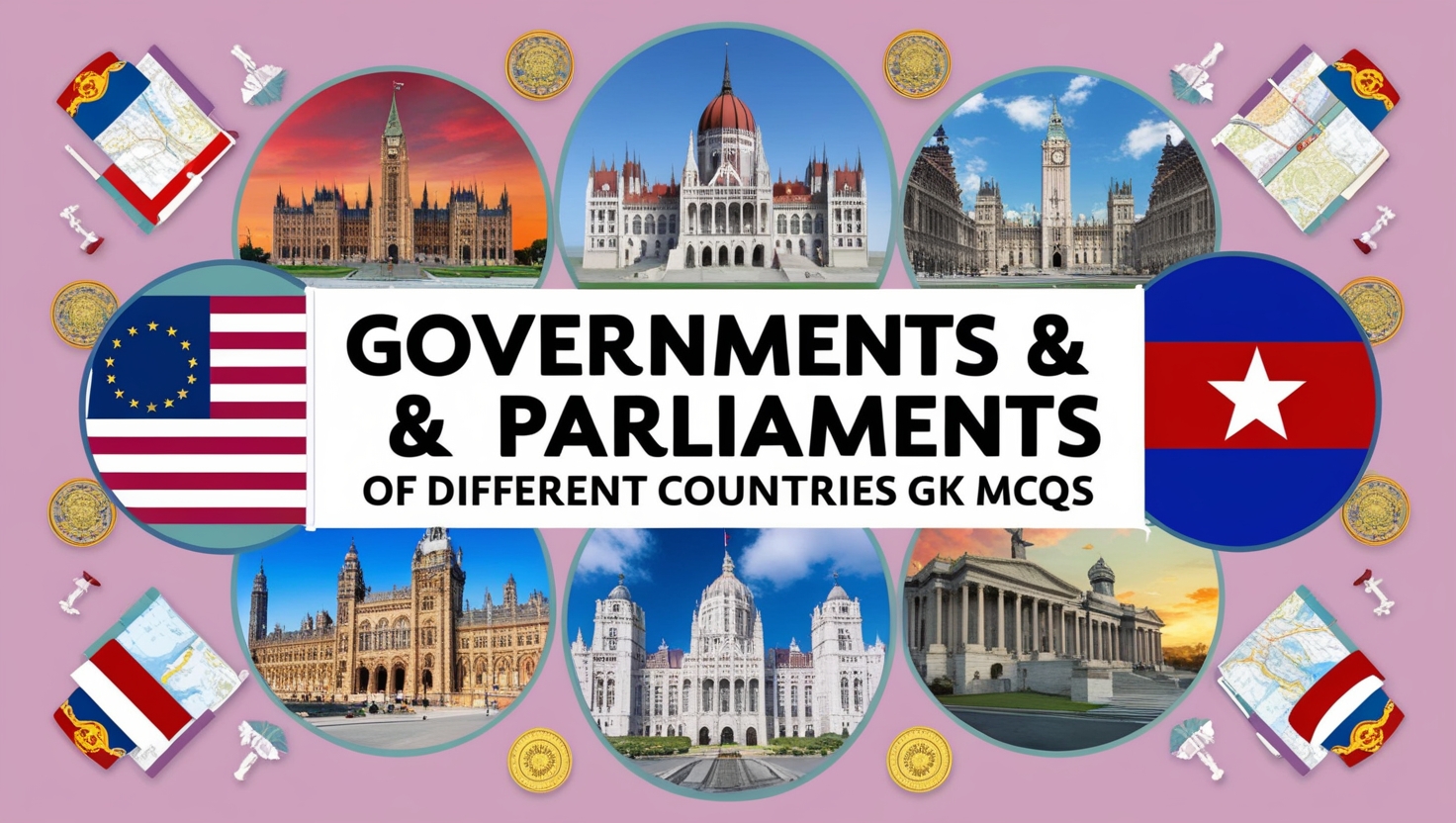
Understanding the structure and functioning of different governments and parliaments around the world is crucial for anyone interested in global politics. The article titled Governments & Parliaments of Different Countries GK MCQs With Answer & Explanation in English aims to provide a comprehensive overview of this topic.
It features multiple-choice questions (MCQs) that test your knowledge of various governmental systems, their roles, and significant legislative bodies across nations. With detailed answers and explanations, readers can enhance their understanding and prepare effectively for competitive exams and general knowledge assessments.
1. “Riksdag” is the name of the parliament of which country?
- Iran
- Norway
- Sweden
- Kazakhstan
Show Answer
Answer: Sweden
The Riksdag is the national legislature and the supreme decision-making body of the government of Sweden.
2. Pyithu Hluttaw is the lower house of the parliament of which country?
- Myanmar
- Thailand
- Cambodia
- Vietnam
Show Answer
Answer: Myanmar
The House of Representatives or Pyithu Hluttaw is the lower house of the Pyidaungsu Hluttaw, the bicameral legislature of Myanmar (Burma).
3. With which of the following countries is the National People’s Congress related to?
- USA
- UK
- China
- Germany
Show Answer
Answer: China
The National People’s Congress, also called The National People’s Congress of the People’s Republic of China, is the highest organ of state power and the national legislature of China.
4. Which of the following countries’ Lower House is called Gyelyong Tshogdu?
- Bhutan
- Myanmar
- Thailand
- Cambodia
Show Answer
Answer: Bhutan
The Parliament of Bhutan (Dzongkha/gyelyong tshokhang) was formed by the King of Bhutan along with two houses viz. The Lower House called the National Assembly (Gyelyong Tshogdu) and the Upper house called the National Council (Gyelyong Tshogde).
5. Althing is the national parliament of which country?
- Ireland
- Iceland
- Portugal
- Spain
Show Answer
Answer: Iceland
Althing is the national parliament of Iceland and is the oldest functioning parliamentary institution in the world established in 930 AD.
6. The Upper House of Egypt’s parliament is known as:
- Shura Council
- Majilis Al-Sha’ab
- Dewan Rakyat
- Majlis al-Nuwaab
Show Answer
Answer: Shura Council
The Upper House of Egypt’s parliament is known as the Shura Council.
7. Which of the following became the first member country of the United Nations to leave the international criminal court?
- Yemen
- Lebanon
- Burundi
- North Korea
Show Answer
Answer: Burundi
Burundi became the first United Nations country ever to leave the international criminal court. Burundi withdrew from the Rome Statute on October 18, 2016.
8. Consider the following statements about the Performance Grading Index (PGI):
1. The Union Human Resource Development (HRD) ministry is compiling this schooling index.
2. The Index is based on 73 indicators.
Which of the above is/are correct statements?
- 1 only
- 1 and 2 only
- 2 only
- None of the above
Show Answer
Answer: 2 only
The index is aimed at helping states understand where they may be lagging behind. The Index will assess states on a 1,000 point grading system with 10-20 points per parameter and it includes 73 indicators. This index is provided by Ministry of Education.
9. Goswami committee was appointed in which year?
- 1980
- 1985
- 1990
- 1995
Show Answer
Answer: 1990
The Goswami committee was appointed in the year 1990. The committee recommended a time limit for bye elections and also recommended checks on advertisements in newspapers and strengthening of the Election Commission of India.
10. In which year was the Transgender Persons (Protection of Rights) Act passed?
- 2017
- 2018
- 2019
- 2020
Show Answer
Answer: 2019
The Transgender Persons (Protection of Rights) Act was passed by the Parliament of India in 2019. It was aimed at protecting the rights of transgender persons, their welfare, and other related matters.








Leave a Reply